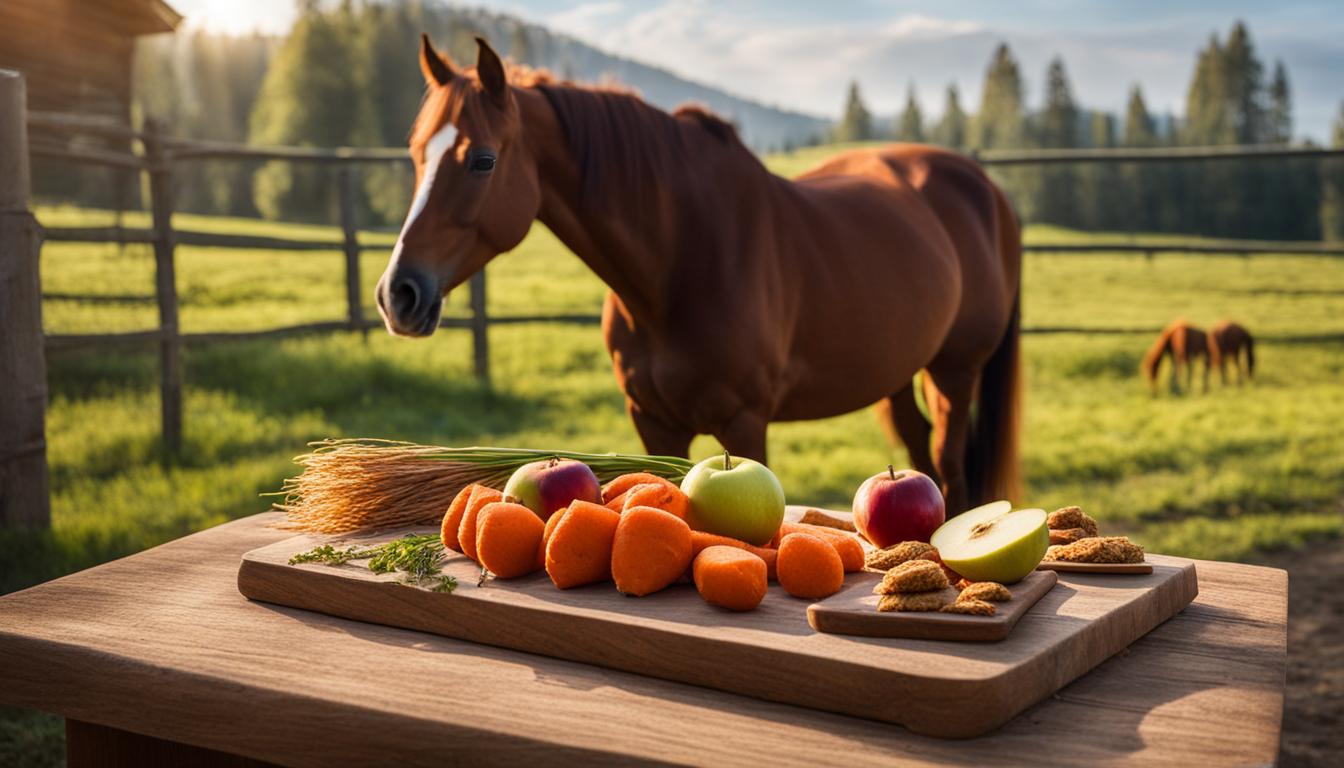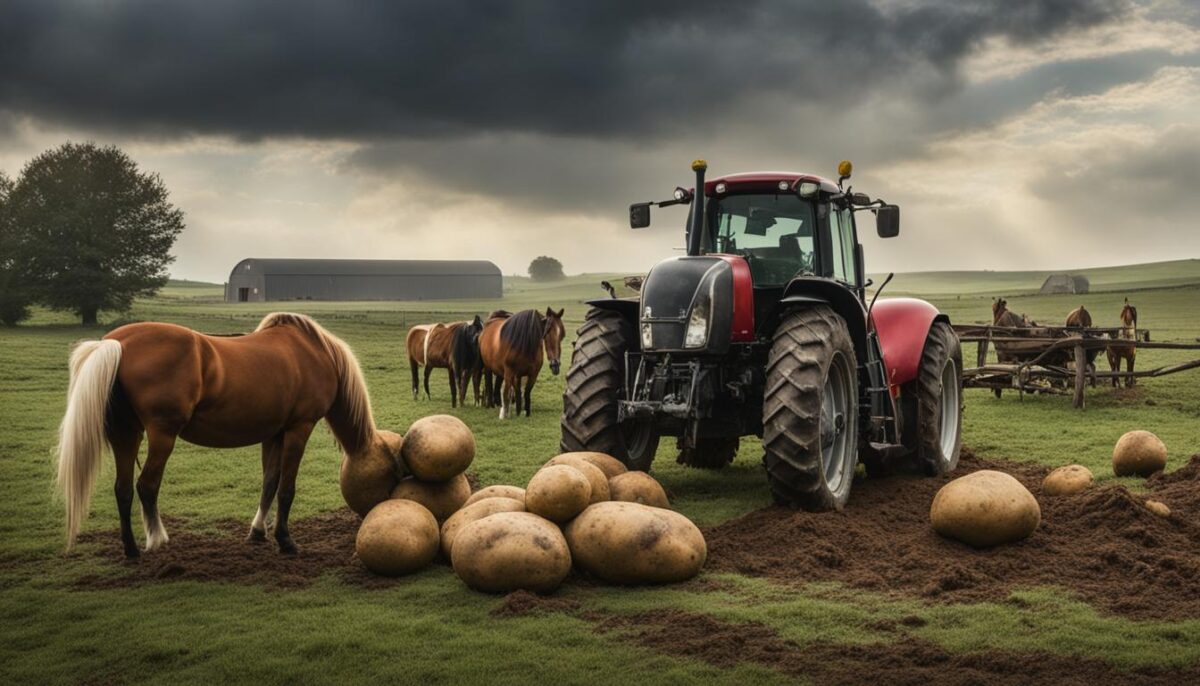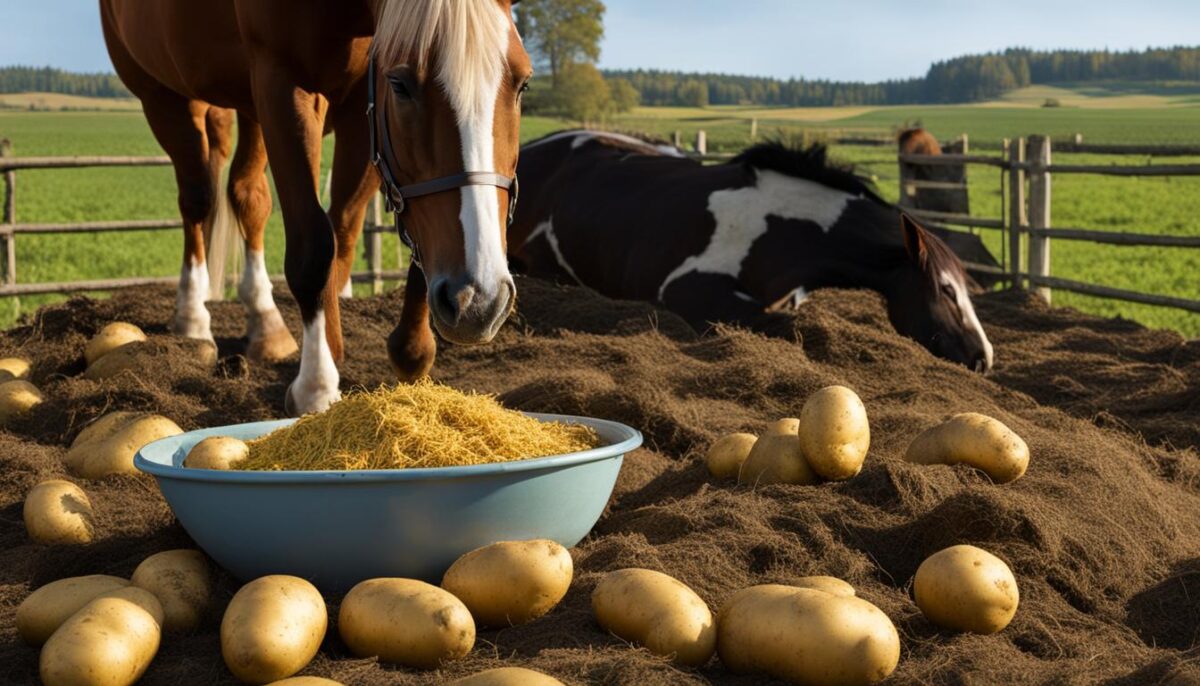Hey there, horse lovers! You might be munching on some yummy potatoes and think, “Can my horse have some too?” Well, let’s talk about horses and spuds. Those tasty potatoes are part of a plant group that could be bad for horses. They have something called solanine in them. Solanine isn’t good for horses to eat. Cooking potatoes makes the solanine less, but it’s still better not to give them to your horse.
Also, potatoes have lots of something called starch. And guess what? Too much starch isn’t good for your horse’s tummy. Plus, the green parts of potatoes and potato skins have even more solanine. So what should you do? The best thing is to talk to a vet or a horse food expert before giving new snacks to your horse. They know a lot about equine diets, health impacts of potatoes on horses, and safe horse feeding practices.
Key Takeaways
- Potatoes have solanine which can be harmful to horses.
- Cooking potatoes lowers solanine but doesn’t make them completely safe.
- Horses shouldn’t eat too much starch from potatoes.
- Green potato parts and skins are especially risky for horses.
- Always consult your vet before introducing new foods to your horse’s diet.
The Equine Diet Basics and Potato Consumption
When thinking about what horses eat every day, we have a simple rule to follow. Horses like to graze on hay and grass, and sometimes they get special horse feed too. This keeps them feeling good and full of zip. But there are some foods, like potatoes, that can make a horse’s belly upset. Let’s take a closer look at why the typical horse diet works so well for them and why potatoes might not fit in.
What Horses Typically Eat
Horses love to munch. They spend a lot of time eating stuff like hay and grass. This isn’t just because it tastes good – it’s because their big tummies need lots of fiber to stay healthy. Plus, they get special horse pellets or grains that have all the nutrients they need to be strong and peppy.
Why Potatoes Cause Concern
You might wonder if sharing your potato with your horse is okay. It’s not a great idea, though. Potatoes belong to a group of plants that have something sneaky called solanine. This can make horses feel sick if they eat too much of it. Potatoes also have lots of starch, and starch is tough on a horse’s tummy.
The Nutritional Makeup of Potatoes
Potatoes do have some good stuff in them like vitamins C and B6. They also have a mineral called potassium. But that tricky solanine and too much starch mean horses shouldn’t have potatoes. Even if potatoes can be good for people, what’s yummy for you might not be good for your horse.
Remember, horses love their hay, grass, and special horse feed because that’s what’s best for them. Keep giving your horse what it loves and leave the potatoes to enjoy by yourself!
Understanding Why Potatoes are Risky for Horses
Horses are great, right? They run fast and look awesome. But there’s one thing they shouldn’t eat, and that’s potatoes. Why? Because potatoes have something called solanine in them, which isn’t good for horses. Let’s find out what solanine is and why we shouldn’t give potatoes to horses.
Identifying Solanine and Its Effects
So, solanine is this thing in potatoes that can make horses feel super sick. It’s a kind of poison that’s also in other plants like tomatoes and peppers – foods we enjoy but can be harmful to our horse buddies. When horses eat potatoes, even a tiny bit can hurt their stomachs. It’s like how eating too much candy makes us feel icky, except way worse for horses.
How Potatoes Differ from Other Equine Foods
Now, you know how apples and carrots are tasty snacks for horses? Well, potatoes are different. They might be yummy to us but not for horses. Unlike the good snacking options, potatoes are high in starch and solanine, which can cause tummy trouble for these beautiful animals. This is a big reason why people food doesn’t always belong in a horse’s tummy. So remember, what’s good for you might not be so great for your horsey friend.
| Horse-Safe Snacks | Why They’re Safe |
|---|---|
| Apples and Carrots | Low in starch, no solanine, and horses love them! |
| Hay and Grains | Just the right stuff for a horse’s everyday diet. |
So now you see why we should keep potatoes away from horses. Stick with the stuff they already love to eat, and they’ll be happier, healthier, and ready for any adventure!
Can Horses Eat Potatoes?
When you’re eating delicious potatoes, you might look over at your horse and wonder, “Can my horse share my snack?” Potatoes are tricky for horses. They’re not the same as sweet potatoes and can be dangerous for your horse buddy. Potatoes have something called solanine that is not good for horses. It can make them really sick.
Even if you cook potatoes, it doesn’t make them totally safe for horses. Mashed potatoes, french fries, or any kind of cooked potatoes might still hurt your horse. We need to be very careful with potato consumption in horses. It’s better to stay on the safe side and not let our horses have potatoes at all.
If you really want to know about feeding guidelines for potatoes in horses, know this: potatoes should be kept far away from the horse’s diet. Instead, give treats that keep horses happy and healthy. Like what? Apples, carrots, and hay are all super good for them. They love to eat those things, and they’re safe too!
What if you see your horse looks weak or has tummy pain? These could be signs of a horse getting too much solanine from eating potatoes. That’s when it’s really important to talk to your horse doctor. They can help your horse feel better.
| What Horses Should Eat | What Horses Shouldn’t Eat |
|---|---|
| Apples and carrots | Potatoes because of solanine |
| Hay and special horse feed | Green parts of potatoes, like skins |
| Fresh water and grass | Treats with lots of sugar or starch |
So remember, when it comes to potato and equine health, it’s best not to mix them. Keep your horse munching on things that are made just for them and watch them be healthy and happy!
Safe Snacking: Alternatives to Potatoes for Horses
Let’s talk about yummy snacks for your horse that are safe and healthy. Just like we pick out snacks that are good for us, we want to do the same for our horse pals. Instead of potatoes, let’s find some alternative foods for horses that they can munch on with a big ‘ol happy face.
Healthy Equine Treat Options
Got a crunchy carrot? Horses say “Yes, please!” Apples? They love ’em too! These are safe horse treats that won’t make their bellies upset. Just make sure to cut them into little pieces so it’s easy for your horse to chew and swallow. And hey, giving treats is also a nice way to tell your horse, “You’re the best!”
Fruits and Vegetables Horses Can Safely Enjoy
There’s a bunch of other fruits and vegetables suitable for equine consumption. How about a banana? Chop it up into small, horse-sized bites. What about cucumbers? Slice them thin and watch your horse crunch away. Remember, giving treats is like giving hugs – not too many, just enough to show you care. If you want to try new snacks, just ask your vet. They know what’s great for your horse to eat.
FAQ
Can horses eat potatoes?
Generally, it’s not recommended to feed horses potatoes. They contain solanine, a toxin that can be harmful to equine health. While cooking can reduce solanine levels, the high starch content in potatoes isn’t ideal for a horse’s digestive system either. Therefore, it’s best to avoid including potatoes in your horse’s diet.
What do horses typically eat?
Horses typically consume a diet of hay, grass, and specialized horse feed, which provides them with the necessary nutrients and energy. This diet is specifically formulated to maintain a balanced and healthy digestive system for equines.
Why do potatoes cause concern when feeding horses?
Potatoes cause concern because they are part of the nightshade family and contain solanine—a toxin that can lead to health issues in horses, including gastrointestinal distress, weakness, and respiratory problems. Additionally, the high starch content in potatoes can lead to digestive upsets in horses.
What is the nutritional makeup of potatoes?
Potatoes are rich in vitamins like Vitamin C and B6 and contain minerals such as potassium. However, despite these nutrients, the risks associated with solanine and high starch content make them an unsuitable choice for horses.
What are the effects of solanine on horses?
Solanine can cause a variety of symptoms in horses, from mild to severe, including gastrointestinal upset, colic, weakness, and in serious cases, respiratory difficulties. It is toxic to horses, and even small amounts can be problematic.
How do potatoes differ from other equine-safe foods?
Potatoes differ greatly from equine-safe foods like apples and carrots, which are commonly used as treats. These horse-safe snacks do not contain solanine and are easy to digest, making them a much better option for your horse’s health and well-being.
Are there any feeding guidelines for potatoes in horses?
The consensus among equine health professionals is that potatoes should not be included in a horse’s diet, hence there are no recommended feeding guidelines for potatoes. It’s always best to adhere to horse-safe fruits and vegetables and consult with your vet before introducing new foods to your horse.
What are some healthy equine treat options?
Healthy treat options for horses include carrots, apples, and other horse-safe fruits like bananas, and vegetables like cucumbers and squash. Always serve these treats in moderation and ensure they are cut into appropriate sizes to prevent choking hazards.
Can horses enjoy fruits and vegetables other than potatoes?
Yes, horses can enjoy a variety of fruits and vegetables besides potatoes. Options like apples, carrots, bananas, and cucumbers can be safe and healthy treats when offered in moderation. These provide a good source of vitamins and minerals and can add variety to the horse’s diet.


